|
|
|
Sort Order |
|
|
|
Items / Page
|
|
|
|
|
|
|
| Srl | Item |
| 1 |
ID:
113729
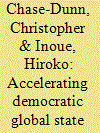

|
|
|
|
|
| Publication |
2012.
|
| Summary/Abstract |
This article discusses the evolution of the international system and global governance within the Europe-centred modern world-system since the 15th century in the context of a comparative framework that includes interpolity systems since the Stone Age. The evolution of the modern system includes the emergence of the European system of sovereign national states and colonial empires, the extension of the Westphalian system to the non-core by succeeding waves of decolonization, the rise and fall of successively larger hegemons, the deepening of global capitalism in waves of globalization, the emergence of weak international regulatory institutions and the prospects for and the rapid emergence of global democracy. It is not claimed that a global state has already emerged, but the authors see the long-term processes as the early stages of the emergence of a world state, and consider how these processes might be accelerated within the next few decades. The need for democratization of the institutions of global governance is also discussed. However, in this article, the focus is more on real geo-historical processes than normative questions, outlining the evolution of interpolity institutional orders, describing the challenges in thinking about global state formation, and discussing some of the technological and political forces that might accelerate the long-term trend toward global state formation.
|
|
|
|
|
|
|
|
|
|
|
|
|
|
|
|
| 2 |
ID:
141199
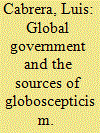

|
|
|
|
|
| Summary/Abstract |
While a number of prominent researchers have recently turned their attention to the likelihood or desirability of full world government, such an ideal has little current support in civic and popular discourse. This article seeks to identify some factors possibly reinforcing such ‘globoscepticism’. After first discussing why it should not be seen as prima facie absurd to support global political integration, and noting widespread popular support in the immediate aftermath of the Second World War, it turns to some findings on the sources of Euroscepticism. This phenomenon involves negative attitudes expressed by political elites and ordinary citizens towards European Union integration. Also considered are the determinants of attitudes towards international trade liberalisation. Insights from both areas can be applied to a preliminary exploration of globoscepticism. Specifically, they can enrich an analysis of domestic biases which naturally arise and are reinforced within a sovereign states system, and which tend to diminish support for comprehensive projects beyond the state. These pose challenges that must be addressed by academic advocates of full global integration, as well as advocates of still-ambitious but far less comprehensive projects of suprastate institution building.
|
|
|
|
|
|
|
|
|
|
|
|
|
|
|
|
| 3 |
ID:
146265
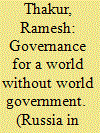

|
|
|
|
|
| Summary/Abstract |
There is no government for the world. Yet, on any given day, innumerable commercial, professional, diplomatic and personal cross-border activities take place in reasonable expectation of safety and security for the people, groups, firms and governments involved. Disruptions and threats are rare-indeed, in many instances rarer in the international domain than inside some countries. Thus international transactions are typically characterized by order, stability and predictability. This immediately raises a puzzle: how is the world governed even in the absence of a world government in order to produce norms, codes of conduct and regulatory, surveillance and compliance instruments? The answer is global governance whose content embraces the totality of laws, norms, policies and institutions that define, constitute and mediate relations between citizens, societies, markets and states in the international system.
|
|
|
|
|
|
|
|
|
|
|
|
|
|
|
|
| 4 |
ID:
129020
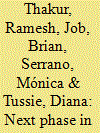

|
|
|
|
|
| Publication |
2014.
|
| Summary/Abstract |
THE KEY INSIGHT EXPRESSED IN THE STRIKING WORDS OF THE BRUNDTLAND Commission-"The Earth is one but the world is not"1-remains as relevant a political statement about most global governance challenges today as it was about sustainable development twenty-seven years ago. Global governance entails multilevel and networked relations and interactions for managing and facilitating linkages across policy levels and domains. It consists of formal and informal arrangements that provide more order and stability for a world in constant and rapid flux than would occur naturally-the range of international cooperation without a world government. Intensifying global interdependence, growing recognition of problems that defy solutions by a single state or organization, and increasing numbers and importance of nonstate actors have all contributed to the growth of global governance as an analytical framework.
|
|
|
|
|
|
|
|
|
|
|
|
|
|
|
|
| 5 |
ID:
142421
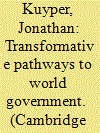

|
|
|
|
|
| Summary/Abstract |
Proposals for world government (WG) have come from a variety of sources including international relations (IR) scholars, economists, normative political theorists and global justice academics. In general, these visions are couched as ideal models to be approximated as closely as possible. The key argument of the article is that, in evaluating the democratic potential of these proposals, we should focus upon the process of designing and building a WG. This is because there is an ineluctable gap between ideal conceptualization and non-ideal realization that emerges through institutionalization. I employ a historical institutionalist lens to describe and problematize potential institutional shifts along a WG pathway. I argue that institutionalizing these ideal visions in our current, non-ideal context would actually exacerbate the democratic deficit. Specifically, building a WG would likely entrench existing inequalities, expand the authority of unaccountable bureaucrats and limit institutional improvements over time. These three points respectively undercut three core values of democratization: equal participation, accountability and institutional revisability. Given this argument, I conclude that an incremental approach—which focuses on advancing values rather than moving towards an ideal model—represents a more productive pathway for global democratization.
|
|
|
|
|
|
|
|
|
|
|
|
|
|
|
|
| 6 |
ID:
089031
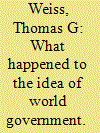

|
|
|
|
|
| Publication |
2009.
|
| Summary/Abstract |
What happened to the idea of world government, so central in the United States to public debate of the 1930s and 1940s, and why has it been replaced by "global governance"? This article reviews the reasons behind that evolution-the need to incorporate interdependence and nonstate actors into analytical frameworks along with a lack of imagination from analysts-as well as the pluses and minuses of both concepts. When states still could solve or attenuate most problems, world government remained a possible objective and not far from the mainstream. Paradoxically, now that states visibly cannot address a growing number of transboundary threats, world government is unimaginable; and even more robust international organizations are often looked upon askance. Could the same far-sighted American political commitment that created a new generation of international organizations after World War II re-emerge under the Obama administration, if not in 2009, then at least by the end of a second term?
|
|
|
|
|
|
|
|
|
|
|
|
|
|
|
|
|
|
|
|
|